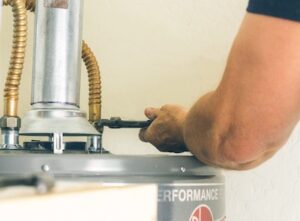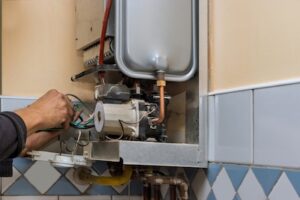The Signs That Your Water Heater Is Going to Fail
If you own a hot water system in your home, it will likely serve you over several years without failure. However, like every other appliance, water heaters do not last forever. So, what are the signs that your water heater is going to fail? The eight signs that your water heater is going to fail are:
- T&P Valve Is Leaking
- Water Is Discolored or Gritty
- Running Out of Hot Water Quickly
- Water Doesn’t Get Hot Enough
- More Than a Decade Old
- Unusual Sounds
- Water Leaking
- Water Has a Bad Odor
Hot water is provided by a water heater for bathing, cooking, and cleaning. So, when it fails, it can be highly inconvenient. There are several indicators that your water heater is ready to die. If you observe any of these symptoms, you should contact a plumber as soon as possible to prevent your water heater from completely failing.

What Are the Most Common Water Heater Problems?
The aggregate buildup is a common source of water heater difficulties. Sediment can build up in the tank’s bottom, overloading the radiator and eventually malfunctioning.
Leakage, corrosion, and excessive noise are also common water heater issues. These issues are frequently resolved by merely swapping a part or two. However, if the situation is complex, the complete water heater may need to be replaced.
A spark bulb that won’t remain lighted is one of the most typical difficulties with a gas water heater. This might be due to several factors, including a dirty pilot light, a thermostatic issue, or a gas leak.
A broken circuit is the most typical problem with an electric water heating unit. This might be due to a malfunctioning heating element, a thermostat malfunction, or a wiring issue.
A leaking T&P valve frequently indicates that the water heater is not functioning correctly. Suppose the water heater cannot keep the water at the right temperature. In that case, the pressure might accumulate and cause the T&P valve to leak. This could indicate that your water heater needs to be fixed or replaced.
If you’re not experienced in working with water heaters, then you might be wondering what is a T&P valve and what does it do? Well, you better read up on it as it causes one of the most common water heater issues.
The 8 Signs Your Water Heater Is Going to Fail
1. T&P Valve Is Leaking
A temperature and pressure relief valve, often known as a T&P Valve, is standard on all water heaters. If the warmth or volume in the water heater becomes too excessive, this valve permits water or steam to depart. This keeps a water heater from bursting or becoming a projectile.
The relief valve on the hot water system is a critical safety element. If the temperature inside the unit becomes too hot (typically above 210 degrees) or the air within the unit becomes too high (above 150 psi), the water heater might become damaged or explode.
If the T&P valve is leaking, the water heater cannot release the pressure that has built up inside. This can be caused by several things, but it is most likely a sign that the water heater is going wrong and will need to be replaced.

2. Water Is Discolored or Gritty
If all of your water appears rusty or smells strange, there is most likely an issue with your pipes. If your find that only your hot water looks strange, your water heater is most likely to blame.
There are various types of hot water discoloration. It could have an orange or brownish appearance, a rusty flavor, or a gritty texture. It could also have a yellow or greenish appearance and taste or feel slimy. In any case, it’s a warning that something may be amiss with your water heater’s reservoir.
An anode rod is a substance found within your water heating system. The rod’s end finally wore down and rusted quicker than the container itself, earning it the moniker “sacrificial.”
The anode material, such as magnesium, maintains the tank’s water in a chemical state that prevents tank erosion. The problem is that the anode typically needs to be replaced a minimum of 2-3 times over the tank’s lifetime.
3. Running Out of Hot Water Quickly
If you haven’t cleaned your hot water heater regularly or if your water contains a lot of sediment, such particles may accumulate in the tank. Sediment builds up at the bottom of the hot water system tank, occupying space usually occupied by water. This kind of build-up is one of the most common plumbing problems every homeowner faces.
This limits the volume of water the container can store and, as a result, the temperature of the water the radiator can provide. Furthermore, sediment might protect the tank’s bottom, preventing heat from being delivered to the water adequately.
As a result, the water at the bottom of the tank may be substantially warmer than the water at the surface, causing the container to boil and perhaps break.
Finally, as sediment accumulates, it can choke the pipelines running to and from the water heater, thus restricting water flow and decreasing the quantity of hot water the boiler can supply. As a result, the water heater may overheat and fail. To fix the issue you will need to flush your water heater.
4. Water Doesn’t Get Hot Enough
A faulty dip tube is the most common cause of your hot water running out rapidly. This can occur if the dip tube is old and corroded or if the incorrect size or kind was inserted.
When this tube fails, cold water lingers at the summit and interacts with the warm water brought to your home. This reduces the warmth of the water that reaches you.
Another option is that the water heater’s temp preset is just too inadequate. As a result, the water may cool too quickly, making it hard to obtain hot water.
5. More Than a Decade Old
If your hot water tank is more significant than a decade old, it is a clue that it may be close to breaking down. A water heater’s expected lifespan is about 8-12 years, so when yours is older, it’s time to consider replacing it.
An outdated water heater can have a few issues, such as the reservoir wearing out, the components incinerating, or the pilot light breaking. If any of these problems occur, your water heater needs to be replaced.
If your unit is a decade or older, you must be cautious. Most businesses place a tag with an initial installation date on it. You can use the trademark and unit registration number to look up the manufacturing date online if it isn’t available.

6. Unusual Sounds
If your water heater is producing strange noises, it could indicate that it is failing. The sounds could suggest that the water heater is overheated or that the tank is rusting.
Another symptom of a malfunction in your hot water system malfunction is that you begin to hear a crackling sound. This could indicate a fuel leak from the hot water system.
If you hear a crackling noise, switch off the gas to the hot water system promptly and call a contractor to arrive and address the problem. If you attend one of the following abnormal sounds, you must immediately contact a plumber working on this issue.
7. Water Leaking
If you discover your water heater leaking, it’s time to replace it. Suppose you notice water leaking and gathering around the tank or the pipes going to the tank. In that case, there is obviously a problem that must be addressed immediately.
Leaks usually do not stop on their own. They can also cause considerable destruction of property if disregarded. Besides the fact that you have to contend with damp furniture, rugs, walls, and other items, you may also have to manage the encroaching infestation. A hot water tank leak should be addressed as soon as feasible.
8. Water Has a Bad Odor
This sulfuric, rotten egg stench in your hot water system can be caused by various factors, including the existence of sulfate-reducing microorganisms in your water reservoir or a chemical reaction involving your system’s aluminum anode rod in your hot water.
Sulfate is commonly found in treated water, which accounts for the vast bulk of water obtained in a municipality. When there are significant levels of sulfur-reducing bacteria in the water, it can degrade into deadly hydrogen sulfide.
Another possibility is that the anode rod within the heater has become rusted. The anode rod is a metal rod that is put into the water heater to aid with corrosion prevention.
Final Words
When your water heater begins to show symptoms of wear and tear, it is essential to understand when to upgrade it. There are a few critical indicators that your water heater is nearing the end of its life. So if you detect any of these, it’s time to seek an alternative. Our advice is to not procrastinate until your hot water tank malfunctions entirely. Because it will be too late by then. You can escape the discomfort and inconvenience of a total breakdown by focusing on the signals and replacing your hot water system before something malfunctions.
Related Questions
What Is the Difference Between an Electric and a Gas Water Heater?
The primary distinction is the supply of warmth. An electric water heater employs heating elements that are powered by electricity. In contrast, a gas water heater uses a burner powered by gas.
Who Should You Call When Your Water Heater Is Not Working?
Rather than engaging a general plumber or electrician, choose an experienced local HVAC company. This level of expertise helps ensure you receive quality service that fixes your water heater.
